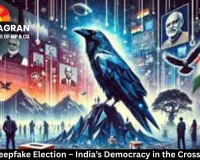The War You Can't See: How Digital Phantoms Hijacked an India-Pakistan Crisis
Digital Desk
.jpg)
How sure are you that the video you just shared is real?
That’s not a theoretical question anymore. It’s the terrifying reality that gripped the nation during the recent flare-up with Pakistan. While our brave soldiers stood guard at the border, a different, more insidious battle was raging on your smartphone screens. The real crisis wasn’t just in the skies; it was in the digital fog of war, where truth became the first casualty, and India’s national security found a new, vulnerable front.
Recall the footage that flooded your family WhatsApp groups and trending Twitter feeds: grainy videos of jet contrails purportedly showing a downed fighter, explosive sounds passed off as "live from the border," and even mainstream news channels, in a desperate race for ratings, airing clips from video games and old conflicts as breaking news. The most sinister development? The deployment of AI-generated "deepfakes"—fabricated videos of our leaders giving statements they never made, designed to sow panic and erode trust at a moment of peak national anxiety.
This isn't just misinformation; it's a strategic weapon. Adversaries no longer need to win in the air; they just need to win in the algorithm. By flooding our digital public square with plausible lies, they aim to paralyze our response, turn our citizens against each other, and make rational, evidence-based decision-making impossible for our leadership. When every citizen becomes a potential, unwitting carrier of enemy propaganda, the very concept of a unified national response crumbles.
So, what do we do? We must become a nation of digital skeptics. Before you hit "share," pause. Ask yourself: Who is the source? Does this video have a verifiable time and location? Does the audio match the video quality? Look for official confirmation, not just the loudest voice. We need a public information ecosystem that prizes verification over virality.
The government and tech platforms have a profound role to play, but the first line of defense is you. Our national security is no longer just about tanks and treaties. It’s about our collective ability to discern fact from fiction. The next time the siren of digital panic blares, will you be part of the shield, or will you amplify the weapon?

.jpg)
.jpg)

.jpg)
.jpg)
.jpg)
.jpg)
.jpg)
.jpg)
.jpg)
